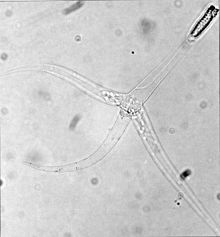Myxozoan
| Myxozoa | |
|---|---|
 |
|
| Triactinomyxon stage of Myxobolus cerebralis. | |
| Scientific classification | |
| Kingdom: | Animalia |
| Phylum: | Cnidaria |
| (unranked): |
Myxozoa Grassé, 1970 |
Myxozoa (etymology: Greek: μύξα myxa "slime" or "mucus" + thematic vowel o + ζῷον zoon "animals") is a group of aquatic, obligately parasitic cnidarian animals. Over 1300 species have been described and many have a two-host lifecycle, involving a fish and an annelid worm or a bryozoan. The average size of a myxosporean spore usually ranges from 10 μm to 20 μm, whereas that of a malacosporean spore can be up to 2 mm. Myxozoans can live in both freshwater and marine habitats.
While the evolutionary history of myxozoans is still an active area of research, it is now understood that myxozoans are highly derived Cnidarians that have undergone dramatic evolution from a free swimming, self-sufficient jellyfish-like creature into their current form of obligate parasites composed of a mere handful of cells. As myxozoans evolved into microscopic parasites, they lost many genes responsible for multicellular development, coordination, and cell-cell communication. The genomes of some myxozoans are now among the smallest genomes of any known animal species.
The Myxozoans were originally considered protozoan, and were included among other non-motile forms in the group Sporozoa. As their distinct nature became clear through 18S ribosomal DNA (rDNA) sequencing, they were relocated in the metazoa. Further classification was hindered by conflicting evidence: although 18S rDNA suggested an affinity with Cnidaria, other rDNA sampled, and the HOX genes of two species, were more similar to those of the Bilateria.
The discovery that Buddenbrockia plumatellae, a worm-like parasite of bryozoans up to 2 mm in length, is a myxozoan initially appeared to strengthen the case for a bilaterian origin, as the body plan is superficially similar. Nevertheless, closer examination reveals that Buddenbrockia's longitudinal symmetry is not twofold, but fourfold, casting doubt on this hypothesis.
...
Wikipedia
